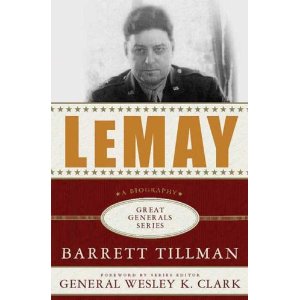LeMay: Barrett Tillman’s biography in the Great Generals Series
Before deciding whether or not Barrett Tillman’s biography of controversial American airman Chester LeMay is for you, two things are worth considering.
First, it is a relatively short book – under 200 pages even with wide margins, generous line spacing and a good-sized font. It therefore does not have the space for detailed study of the major controversies throughout his career, such as the fire bombing of Japanese cities, with the raid of Tokyo alone killing more on one night than died on the day in the Hiroshima nuclear bomb attack, his desire to bomb Cuba during the Cuban missile crisis or his public claims about relative American military weakness compared to the Soviets which the evidence, now at least, doesn’t seem to substantiate. What you will get from the book is a brief overview of the controversies, and a generally pro-LeMay account of them, but little in the way of evidence to help the reader form their own view of them.
Second, the book is part of the publisher’s ‘Great General Series’ subtitled ‘Lessons in Leadership’. It is in large part therefore aimed at business people who are looking for lessons in management and leadership. LeMay is a good military figure to look at in that regard as his career regularly featured improving a failing organisation, building up a large organisation and running a large organisation well. Moreover, in all these roles motivating and training more junior members of the armed forces were central to his success, as was his willingness to look at results, analyse evidence and come up with new solutions to problems.
All this means that one thing you don’t get much of from the book is an understanding of how LeMay was seen as so ready to bomb others that he was nicknamed ‘Bombs Away LeMay’ or how questions over LeMay’s willingness to fight a nuclear war, even one not authorised first by politicians, made him the role model for General Jack D. Ripper in Stanley Kubrick’s film Dr. Strangelove.
Some of the controversies over whether the US should have used more military force during the Cold War are talked about in the book, but overall it would be easy to come away from reading the book and not appreciate quite how heavily and widely vilified LeMay was in many quarters. LeMay’s decision to run as Vice-Presidential candidate alongside George Wallace’s ultra-segregationist American Presidential bid is also treated briefly and sympathetically.
This means that Barrett Tillman’s book is a good introduction to Chester LeMay but, as is inevitable with a brief book, it is just that – an introduction. For the business minded reader, it does a good job of drawing out lessons in leadership they may find applicable. For the history or politics minded reader, it is more a starting point in understanding LeMay than the whole story.

Not to be a pedant Mark, but it's Curtis LeMay not Chester (first paragraph, not the tag), isn't it?